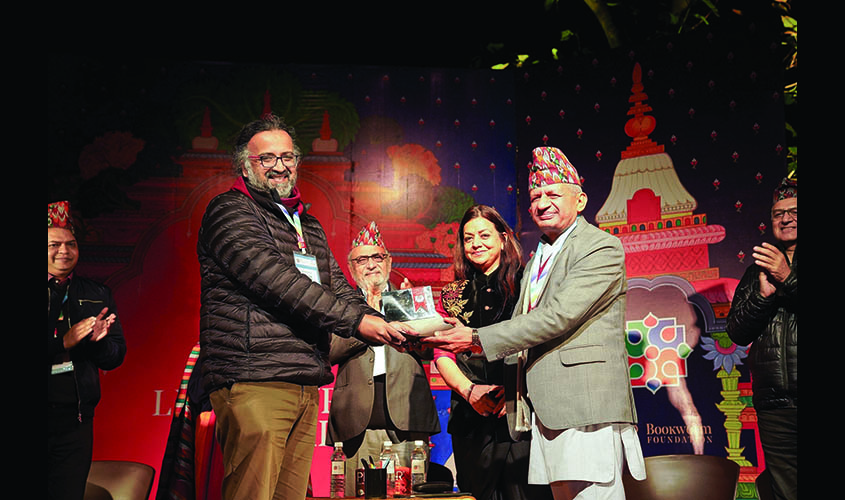Author Amitabha Bagchi has won the $25,000 DSC Prize for South Asian Literature 2019 for his novel Half the Night is Gone. The award ceremony was held in Pokhara, Nepal earlier this week.
Amitabha Bagchi’s novel Half The Night Is Gone has won the DSC Prize for South Asian Literature 2019. The announcement was made at a special event held at the IME Nepal Literature Festival in the city of Pokhara, Nepal, on 16 December.
Apart from Bagchi, the other five shortlisted authors in contention for the $25,000 DSC Prize were Jamil Jan Kochai for his novel 99 Nights in Logar; Madhuri Vijay for The Far Field; Manoranjan Byapari for There’s Gunpowder in the Air; Raj Kamal Jha for The City and the Sea; and Sadia Abbas for The Empty Room.
The five member international jury panel and the shortlisted authors were present at the event where the authors did a reading from their shortlisted novels. The host country—Nepal—was chosen in keeping with the prize’s vision to encourage literary talent in various South Asian countries. Over the past four years, DSC Prize ceremonies have been held in Sri Lanka, Bangladesh and India.

By Amitabha Bagchi
Publisher: Juggernaut Pages: 320
Price: Rs 599
Jury chair, Harish Trivedi, said, “South Asia is now perhaps more visible and more omnipresent than ever before. There is a South Asia at home and a South Asia abroad and both inhabit a shared literary space of writings originally in English or translated into English. The DSC Prize for South Asian Literature is the only prize which encompasses nine different countries in South Asia and the diaspora, and this year we also received entries from some writers with no ethnic connection with South Asia. For the five jury members located in five different countries, reading 90 novels in 90 days was a transformative experience. Over the months, we arrived at a diverse and inclusive longlist of 15 and a shortlist of six novels, representing the polyphonic richness of the region. It is out of this collective literary churning that there has emerged a winner whose work subsumes many languages and sensibilities.”
The DSC Prize for South Asian Literature 2019 was judged by a diverse and distinguished five-member jury panel comprising figures drawn from the international literary fraternity who have worked in or around South Asian literature and issues: namely, Harish Trivedi, former Professor of English at the University of Delhi who has written extensively on colonial and post colonial literature; Jeremy Tambling, former Professor of Literature at the University of Manchester with an interest in present and past literatures, in critical theory, and in film; Kunda Dixit, editor of the Nepali Times newspaper in Kathmandu, and author of several books on the South Asian region, climate change and technology; Carmen Wickramagamage, professor of English at the University of Peradeniya, Sri Lanka, whose work has focused on feminism, postcolonial theory, and “Third World” women writers; and Rifat Munim, a bilingual writer, essayist, and translator, and the literary editor of Dhaka Tribune in Bangladesh, with special interest in South Asian English writing.
According to the jury citation, Bagchi’s novel, though written in English, “feels like a book written in an Indian language, and has the authenticity and the interiority of a work in translation without in fact being a translation”. “The novel evokes the sensibility of not one but three Indian languages: Hindi, Urdu and Sanskrit. It weaves together three parallel stories, interrogating the relationships between men and women, fathers and sons, masters and servants, and the nation and the individual. It is epic in scope, profound in its exploration of class and gender, and elegantly assured in the way it infuses English with Indian wit and wisdom to achieve an unprecedented commingling of different literatures and cultures.”
Pradeep Gyawali, Minister for Foreign Affairs of Nepal, along with Surina Narula, co-founder of the DSC Prize presented the winner’s trophy to Amitabha Bagchi. Ajit Baral, Director of the IME Nepal Literature Festival, made the opening address and welcomed the DSC Prize to Nepal and the city of Pokhara.
Congratulating the winner, Surina Narula, co-founder of the DSC Prize said, “My heartiest congratulations to Amitabha Bagchi for winning the DSC Prize for South Asian Literature 2019 for his brilliant novel Half The Night Is Gone. All the shortlisted books this year deal with diverse and powerful themes and there were three debut novels and a book about Afghanistan. It is a tough decision as always for the jury to choose a winner from these exceptional entries. We are delighted to be invited to give the award this year in Nepal and I hope this encourages more publishers from Nepal to enter their books for the prize next year. The DSC Prize has now completed nine years

